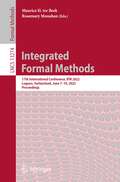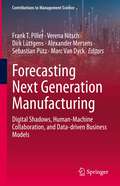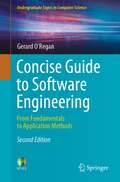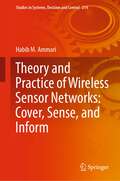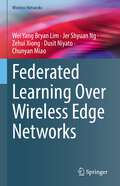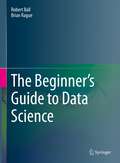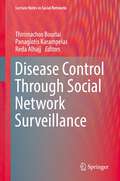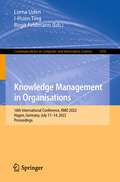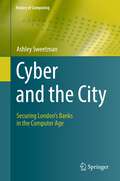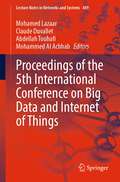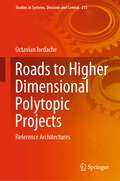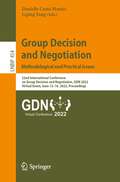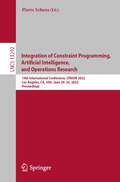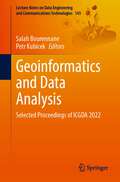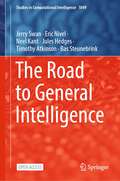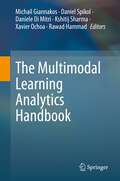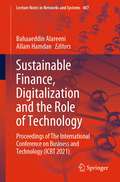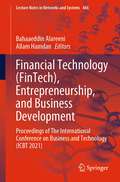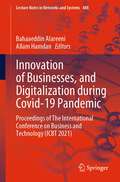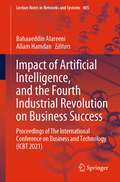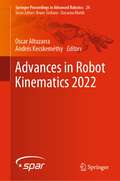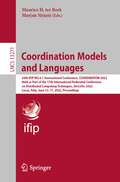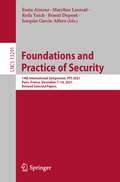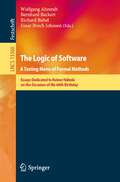- Table View
- List View
Integrated Formal Methods: 17th International Conference, IFM 2022, Lugano, Switzerland, June 7–10, 2022, Proceedings (Lecture Notes in Computer Science #13274)
by Maurice H. ter Beek Rosemary MonahanThis book constitutes the refereed proceedings of the 17th International Conference on Integrated Formal Methods, IFM 2022, held in Lugano, Switzerland, in June 2022. The 14 full papers and 2 short papers were carefully reviewed and selected from 46 submissions. The papers are categorized into the following topical sub-headings: Invited Papers; Cooperative and Relational Verification; B Method; Time; Probability; learning and Synthesis; Security; Stats Analysis and Testing; PhD Symposium Presentations.
Forecasting Next Generation Manufacturing: Digital Shadows, Human-Machine Collaboration, and Data-driven Business Models (Contributions to Management Science)
by Frank T. Piller Verena Nitsch Dirk Lüttgens Alexander Mertens Sebastian Pütz Marc Van DyckManufacturing companies have just begun to implement the concepts of the Fourth Industrial Revolution (Industry 4.0) on a larger scale. Still, this area is characterized by a rapid pace of technological change, blurring boundaries between physical, digital, and biological systems, and a quickly changing growing political, economic, and social environment -- leading to high uncertainty in decision making and many questions about the future development in this field. To provide guidance and inspiration for managers and academics on the future of digital manufacturing systems, this book presents the results of an extensive Delphi study on next-generation manufacturing systems, with a projection period of up to 2030. We analyzed almost 2000 quantitative estimations and more than 600 qualitative arguments from a large panel of industrial and academic experts from Europe, North America, and Asia. The book describes each of the 24 projections in detail, offering current case study examples and related research, as well as implications for policymakers, firms, and individuals. The empirical results also allowed us to build scenarios for the most probable future along the dimensions of governance, organization, capabilities, and interfaces from both a company-internal and an external (network) perspective.
Concise Guide to Software Engineering: From Fundamentals to Application Methods (Undergraduate Topics in Computer Science)
by Gerard O'ReganThis textbook presents a concise introduction to the fundamental principles of software engineering, together with practical guidance on how to apply the theory in a real-world, industrial environment. The wide-ranging coverage encompasses all areas of software design, management, and quality.Topics and features: presents a broad overview of software engineering, including software lifecycles and phases in software development, and project management for software engineering; examines the areas of requirements engineering, software configuration management, software inspections, software testing, software quality assurance, and process quality; covers topics on software metrics and problem solving, software reliability and dependability, and software design and development, including Agile approaches; explains formal methods, a set of mathematical techniques to specify and derive a program from its specification, introducing the Z specification language; discusses software process improvement, describing the CMMI model, and introduces UML, a visual modelling language for software systems; reviews a range of tools to support various activities in software engineering, and offers advice on the selection and management of a software supplier; describes such innovations in the field of software as distributed systems, service-oriented architecture, software as a service, cloud computing, and embedded systems; includes key learning topics, summaries and review questions in each chapter, together with a useful glossary.This practical and easy-to-follow textbook/reference is ideal for computer science students seeking to learn how to build high quality and reliable software on time and on budget. The text also serves as a self-study primer for software engineers, quality professionals, and software managers.
Theory and Practice of Wireless Sensor Networks: Cover, Sense, and Inform (Studies in Systems, Decision and Control #214)
by Habib M. AmmariThis book aims at developing a reader’s thorough understanding of the challenges and opportunities of two categories of networks, namely k-covered wireless sensor networks and k-barrier covered wireless sensor networks. It presents a variety of theoretical studies based on percolation theory, convexity theory, and applied computational geometry, as well as the algorithms and protocols that are essential to their design, analysis, and development. Particularly, this book focuses on the cover, sense, and inform (CSI) paradigm with a goal to build a unified framework, where connected k-coverage (or k-barrier coverage), sensor scheduling, and geographic data forwarding, gathering, and delivery are jointly considered. It provides the interested reader with a fine study of the above networks, which can be covered in introductory and advanced courses on wireless sensor networks. This book is useful to senior undergraduate and graduate students in computer science, computer engineering, electrical engineering, information science, information technology, mathematics, and any related discipline. Also, it is of interest to computer scientists, researchers, and practitioners in academia and industry with interest in these two networks from their deployment until data gathering and delivery.
Federated Learning Over Wireless Edge Networks (Wireless Networks)
by Wei Yang Lim Jer Shyuan Ng Zehui Xiong Dusit Niyato Chunyan MiaoThis book first presents a tutorial on Federated Learning (FL) and its role in enabling Edge Intelligence over wireless edge networks. This provides readers with a concise introduction to the challenges and state-of-the-art approaches towards implementing FL over the wireless edge network. Then, in consideration of resource heterogeneity at the network edge, the authors provide multifaceted solutions at the intersection of network economics, game theory, and machine learning towards improving the efficiency of resource allocation for FL over the wireless edge networks. A clear understanding of such issues and the presented theoretical studies will serve to guide practitioners and researchers in implementing resource-efficient FL systems and solving the open issues in FL respectively.
The Beginner's Guide to Data Science
by Robert Ball Brian RagueThis book discusses the principles and practical applications of data science, addressing key topics including data wrangling, statistics, machine learning, data visualization, natural language processing and time series analysis. Detailed investigations of techniques used in the implementation of recommendation engines and the proper selection of metrics for distance-based analysis are also covered.Utilizing numerous comprehensive code examples, figures, and tables to help clarify and illuminate essential data science topics, the authors provide an extensive treatment and analysis of real-world questions, focusing especially on the task of determining and assessing answers to these questions as expeditiously and precisely as possible. This book addresses the challenges related to uncovering the actionable insights in “big data,” leveraging database and data collection tools such as web scraping and text identification.This book is organized as 11 chapters, structured as independent treatments of the following crucial data science topics:Data gathering and acquisition techniques including data creationManaging, transforming, and organizing data to ultimately package the information into an accessible format ready for analysisFundamentals of descriptive statistics intended to summarize and aggregate data into a few concise but meaningful measurementsInferential statistics that allow us to infer (or generalize) trends about the larger population based only on the sample portion collected and recordedMetrics that measure some quantity such as distance, similarity, or error and which are especially useful when comparing one or more data observationsRecommendation engines representing a set of algorithms designed to predict (or recommend) a particular product, service, or other item of interest a user or customer wishes to buy or utilize in some mannerMachine learning implementations and associated algorithms, comprising core data science technologies with many practical applications, especially predictive analyticsNatural Language Processing, which expedites the parsing and comprehension of written and spoken language in an effective and accurate mannerTime series analysis, techniques to examine and generate forecasts about the progress and evolution of data over timeData science provides the methodology and tools to accurately interpret an increasing volume of incoming information in order to discern patterns, evaluate trends, and make the right decisions. The results of data science analysis provide real world answers to real world questions. Professionals working on data science and business intelligence projects as well as advanced-level students and researchers focused on data science, computer science, business and mathematics programs will benefit from this book.
Disease Control Through Social Network Surveillance (Lecture Notes in Social Networks)
by Thirimachos Bourlai Panagiotis Karampelas Reda AlhajjThis book examines modern paradigms of disease control based on social network surveillance applications, including electronic sentinel surveillance and wireless application-based surveillance science. It also highlights topics that integrate statistical and epidemiological sciences with surveillance practice and, in order to reflect the evolution of social networking practices, discusses topics concerning the challenges for surveillance theory and practice. In turn, the book goes a step further by providing insights on how we need to analyse epidemiological trends by following best practices on distinguishing useful information from noise, namely fake news, false reporting of disease incidents and events, etc. At the same time, we need to be able to protect health-focused applications and communication tools via cybersecurity technologies and to ensure that anonymity of reporting and privacy are preserved. In closing, the book discusses the role and impact of social media on disease surveillance, as well as the current role of communities in infectious disease surveillance and control.
Knowledge Management in Organisations: 16th International Conference, KMO 2022, Hagen, Germany, July 11–14, 2022, Proceedings (Communications in Computer and Information Science #1593)
by Lorna Uden I-Hsien Ting Birgit FeldmannThis book contains the refereed proceedings of the 16th International Conference on Knowledge Management in Organizations, KMO 2022, held in Hagen, Germany, in July 2022. The 24 full papers and 5 short papers accepted for KMO 2022 were selected from 61 submissions and are organized in topical sections on: knowledge transfer and sharing; knowledge and organization; knowledge and service innovation; industry 4.0; information and knowledge systems; intelligent science; AI and new trends in KM.
Cyber and the City: Securing London’s Banks in the Computer Age (History of Computing)
by Ashley SweetmanCyber security is the greatest risk faced by financial institutions today, a risk they have understood and managed for decades longer than is commonly understood. Ever since the major London banks purchased their first computers in the early 1960s, they have had to balance their dependence on those machines with the need to secure their operations and retain the trust of their customers. Technological change in the second half of the 20th century prompted British banks to reevaluate their function as trusted protectors of wealth. In the City of London, the capital’s oldest area and historically its business and commerce hub, the colossal clearing banks employed newly commercialised electronic computers—the processing power of which could transform the highly clerical clearing and settlement process. What unfolded over the following three decades was a relentless modernisation drive. Revolutionising the way that banks and other financial institutions conducted business and interacted with each other and permanently altering the speed and scale at which the United Kingdom’s financial sector functioned, this rapid modernisation thrust computer security into the consciousness of bank executives and their clients alike. Dependence on computers quickly grew, and the banks immediately realised the need to secure their new software and hardware. Focusing on the period 1960 to 1990, this book uses newly released and previously unexplored archival material to trace the origins of cyber security in the UK financial sector. Topics and features: Describes how institutions managed the evolving challenge of computer security in the second half of the 20th century Demonstrates continuity in banks' views of security through the prism of confidentiality, integrity and availability, and the concept of resilience Presents case studies of bank collaboration on computer security through creation of payment systems like SWIFT and CHAPS Outlines the shift from focusing on physical security measures to technical network-protection measures Explores the relationship between banks and the UK Government as bank operations became dependent on computer and network technology This work will be of value to students and academic researchers in the history of computing, financial history, and the history of intelligence and security, as well as the general reader interested in contemporary intelligence, cyber security, and finance.
Proceedings of the 5th International Conference on Big Data and Internet of Things (Lecture Notes in Networks and Systems #489)
by Mohamed Lazaar Claude Duvallet Abdellah Touhafi Mohammed Al AchhabThis book is a collection of papers in the research area of big data, cloud computing, cybersecurity, machine learning, deep learning, e-learning, Internet of Things, reinforcement learning, information system, social media and natural language processing. This book includes papers presented at the 5th International Conference on Big Data Cloud and Internet of Things, BDIoT 2021 during March 17–18, 2021, at ENSIAS, Mohammed V University in Rabat, Morocco.
Roads to Higher Dimensional Polytopic Projects: Reference Architectures (Studies in Systems, Decision and Control #215)
by Octavian IordacheHigh dimensional reference architectures presented here allows confronting and prevailing over the growing complexity of polytopic projects implementations.Such projects should be envisaged giving that conventional systems operations, equipments, methodologies or organizations will reach their limits for self-evolvability in high complexity conditions. Self-evolvable high complexity systems are based on high dimensional polytopic reference architectures.Polytope is the general term of the sequence: point, line, polygon, polyhedron and so on.The polytopic projects are targeting the artificiality, not only for materials where it is well known and applied, but also for biological, cognitive, intelligent and mathematical systems. The book highlights the polytopic projects basic similarity despite the noticeable difference as domains of application. The roads to follow and the algebra of changing roads are emphasized.The book is divided in 9 chapters. Chapter 1 introduces the Polytopic Roadmap to 4D and beyond. The role for the dialogue of processes in duality of the non-Aristotelian Logic of Contradiction and of Included Middle is emphasized for different domains. Chapter 2 refers to chemical systems. Supramolecular chemistry, metal organic frameworks, MOF, and reaction networks, are the examples considered in the frame of polytopic chemistry. Chapter 3 refers to biological systems. Biological dynamical hierarchies and quasi-species are the considered case studies. Technological and scientific projects targeting artificiality for cells and viruses are considered. Chapter 4 refers to cognitive systems. Developmental stages, formal and relational concepts analysis, and neural coding are considered here. The roles of the 4D systems of systems of systems and of conceptual 4D-cube are emphasized. Artificiality for cognitive systems is the object of study.Chapter 5 refers to mathematical systems. Modeling levels and the 4D digital twins are discussed. Hopf monoids as tools for the study of combinations and separations, dual graded graphs and V-models are informally presented. Chapter 6 refers to application of formal concept analysis, FCA, for high dimensional separations, nesting and drug delivery. Chapter 7 refers to polytopic engineering systems as multiscale transfer, distributors-collectors, cyclic operations, middle vessel columns, mixing, assembly and designs. Equipments have been characterized using Polytopic Roadmaps and classified by Periodic Tables. Chapter 8 introduces polytopic industry, economy, society and sustainability. Chapter 9 outlines new domains of interest as arts and architecture, transdisciplinarity, complex systems and unity of sciences and engineering.Polytopic Roadmaps are proposed as Method for experts from various fields to synthesize their thinking and capabilities into new projects implementation to face and surpass high complexity. A repetitive finding of this book is that self-evolvability observed in physical systems is based on the same directed sequence of reference architectures as the self-evolvability of concepts in our mind. Continuing to develop the field of self-evolvable systems and presenting the polytopic roadmaps for 4D and beyond advances in ever growing complexity domains, the book will be useful to engineers, researchers, entrepreneurs and students in different branches of production, complex systems sciences and engineering, ecology and applied mathematics.
Group Decision and Negotiation: 22nd International Conference on Group Decision and Negotiation, GDN 2022, Virtual Event, June 12–16, 2022, Proceedings (Lecture Notes in Business Information Processing #454)
by Danielle Costa Morais Liping FangThis book constitutes the refereed proceedings of the 22nd International Conference on Group Decision and Negotiation, GDN 2022, which was held virtually during June 12–16, 2022. The field of Group Decision and Negotiation focuses on decision processes with at least two participants and a common goal but conflicting individual goals. Research areas of Group Decision and Negotiation include electronic negotiations, experiments, the role of emotions in group decision and negotiations, preference elicitation and decision support for group decisions and negotiations, and conflict resolution principles. This year’s conference focusses on methodological and practical issues. The 9 full papers presented in this volume were carefully reviewed and selected from 68 submissions. They were organized in the following topical sections: Preference modeling for group decision and negotiation; conflict resolution; collaborative decision making processes.
Integration of Constraint Programming, Artificial Intelligence, and Operations Research: 19th International Conference, CPAIOR 2022, Los Angeles, CA, USA, June 20-23, 2022, Proceedings (Lecture Notes in Computer Science #13292)
by Pierre SchausThis book constitutes the proceedings of the 19th International Conference on the Integration of Constraint Programming, Artificial Intelligence, and Operations Research, CPAIOR 2022, which was held in Los Angeles, CA, USA, in June 2022.The 28 regular papers presented were carefully reviewed and selected from a total of 60 submissions. The conference program included a Master Class on the topic "Bridging the Gap between Machine Learning and Optimization”.
Geoinformatics and Data Analysis: Selected Proceedings of ICGDA 2022 (Lecture Notes on Data Engineering and Communications Technologies #143)
by Salah Bourennane Petr KubicekThis book contains the proceedings of the 5th International Conference on Geoinformatics and Data Analysis (ICGDA 2022), held in January 21–23, Paris, France. Geoinformatics helps to support basic scientific inquiry as well as address the complex social and environmental challenges. It becomes very important technology to decision-makers across a wide range of disciplines such as computer science, information technology, software engineering, biogeography, geography, conservation, architecture, spatial analysis and reinforcement learning. The papers included in this proceeding share the latest research results and practical application examples on the methodologies and algorithms in the area of geoinformatics and data analysis, including software and information engineering, environmental geography and geographic information system, which makes the book a valuable reference for researchers, engineers and university students who are working in the field.
The Road to General Intelligence (Studies in Computational Intelligence #1049)
by Bas Steunebrink Jerry Swan Eric Nivel Neel Kant Jules Hedges Timothy AtkinsonHumans have always dreamed of automating laborious physical and intellectual tasks, but the latter has proved more elusive than naively suspected. Seven decades of systematic study of Artificial Intelligence have witnessed cycles of hubris and despair. The successful realization of General Intelligence (evidenced by the kind of cross-domain flexibility enjoyed by humans) will spawn an industry worth billions and transform the range of viable automation tasks.The recent notable successes of Machine Learning has lead to conjecture that it might be the appropriate technology for delivering General Intelligence. In this book, we argue that the framework of machine learning is fundamentally at odds with any reasonable notion of intelligence and that essential insights from previous decades of AI research are being forgotten. We claim that a fundamental change in perspective is required, mirroring that which took place in the philosophy of science in the mid 20th century. We propose a framework for General Intelligence, together with a reference architecture that emphasizes the need for anytime bounded rationality and a situated denotational semantics. We given necessary emphasis to compositional reasoning, with the required compositionality being provided via principled symbolic-numeric inference mechanisms based on universal constructions from category theory.• Details the pragmatic requirements for real-world General Intelligence.• Describes how machine learning fails to meet these requirements.• Provides a philosophical basis for the proposed approach.• Provides mathematical detail for a reference architecture.• Describes a research program intended to address issues of concern in contemporary AI.The book includes an extensive bibliography, with ~400 entries covering the history of AI and many related areas of computer science and mathematics.The target audience is the entire gamut of Artificial Intelligence/Machine Learning researchers and industrial practitioners. There are a mixture of descriptive and rigorous sections, according to the nature of the topic. Undergraduate mathematics is in general sufficient. Familiarity with category theory is advantageous for a complete understanding of the more advanced sections, but these may be skipped by the reader who desires an overall picture of the essential conceptsThis is an open access book.
The Multimodal Learning Analytics Handbook
by Michail Giannakos Daniel Spikol Daniele Di Mitri Kshitij Sharma Xavier Ochoa Rawad HammadThis handbook is the first book ever covering the area of Multimodal Learning Analytics (MMLA). The field of MMLA is an emerging domain of Learning Analytics and plays an important role in expanding the Learning Analytics goal of understanding and improving learning in all the different environments where it occurs. The challenge for research and practice in this field is how to develop theories about the analysis of human behaviors during diverse learning processes and to create useful tools that could augment the capabilities of learners and instructors in a way that is ethical and sustainable. Behind this area, the CrossMMLA research community exchanges ideas on how we can analyze evidence from multimodal and multisystem data and how we can extract meaning from this increasingly fluid and complex data coming from different kinds of transformative learning situations and how to best feed back the results of these analyses to achieve positive transformative actions on those learning processes. This handbook also describes how MMLA uses the advances in machine learning and affordable sensor technologies to act as a virtual observer/analyst of learning activities. The book describes how this “virtual nature” allows MMLA to provide new insights into learning processes that happen across multiple contexts between stakeholders, devices and resources. Using such technologies in combination with machine learning, Learning Analytics researchers can now perform text, speech, handwriting, sketches, gesture, affective, or eye-gaze analysis, improve the accuracy of their predictions and learned models and provide automated feedback to enable learner self-reflection. However, with this increased complexity in data, new challenges also arise. Conducting the data gathering, pre-processing, analysis, annotation and sense-making, in a way that is meaningful for learning scientists and other stakeholders (e.g., students or teachers), still pose challenges in this emergent field. This handbook aims to serve as a unique resource for state of the art methods and processes. Chapter 11 of this book is available open access under a CC BY 4.0 license at link.springer.com.
Sustainable Finance, Digitalization and the Role of Technology: Proceedings of The International Conference on Business and Technology (ICBT 2021) (Lecture Notes in Networks and Systems #487)
by Allam Hamdan Bahaaeddin AlareeniThis book constitutes the refereed proceedings of the International Conference on Business and Technology (ICBT2021) organized by EuroMid Academy of Business & Technology (EMABT), held in Istanbul, between 06–07 November 2021. In response to the call for papers for ICBT2021, 485 papers were submitted for presentation and inclusion in the proceedings of the conference. After a careful blind refereeing process, 292 papers were selected for inclusion in the conference proceedings from forty countries. Each of these chapters was evaluated through an editorial board, and each chapter was passed through a double-blind peer-review process.The book highlights a range of topics in the fields of technology, entrepreneurship, business administration, accounting, and economics that can contribute to business development in countries, such as learning machines, artificial intelligence, big data, deep learning, game-based learning, management information system, accounting information system, knowledge management, entrepreneurship, and social enterprise, corporate social responsibility and sustainability, business policy and strategic management, international management and organizations, organizational behavior and HRM, operations management and logistics research, controversial issues in management and organizations, turnaround, corporate entrepreneurship, innovation, legal issues, business ethics, and firm governance, managerial accounting and firm financial affairs, non-traditional research, and creative methodologies.These proceedings are reflecting quality research contributing theoretical and practical implications, for those who are wise to apply the technology within any business sector. It is our hope that the contribution of this book proceedings will be of the academic level which even decision-makers in the various economic and executive-level will get to appreciate.
Financial Technology: Proceedings of The International Conference on Business and Technology (ICBT 2021) (Lecture Notes in Networks and Systems #486)
by Allam Hamdan Bahaaeddin AlareeniThis book constitutes the refereed proceedings of the International Conference on Business and Technology (ICBT2021) organized by EuroMid Academy of Business & Technology (EMABT), held in Istanbul, between 06–07 November 2021. In response to the call for papers for ICBT2021, 485 papers were submitted for presentation and inclusion in the proceedings of the conference. After a careful blind refereeing process, 292 papers were selected for inclusion in the conference proceedings from forty countries. Each of these chapters was evaluated through an editorial board, and each chapter was passed through a double-blind peer-review process.The book highlights a range of topics in the fields of technology, entrepreneurship, business administration, accounting, and economics that can contribute to business development in countries, such as learning machines, artificial intelligence, big data, deep learning, game-based learning, management information system, accounting information system, knowledge management, entrepreneurship, and social enterprise, corporate social responsibility and sustainability, business policy and strategic management, international management and organizations, organizational behavior and HRM, operations management and logistics research, controversial issues in management and organizations, turnaround, corporate entrepreneurship, innovation, legal issues, business ethics, and firm governance, managerial accounting and firm financial affairs, non-traditional research, and creative methodologies.These proceedings are reflecting quality research contributing theoretical and practical implications, for those who are wise to apply the technology within any business sector. It is our hope that the contribution of this book proceedings will be of the academic level which even decision-makers in the various economic and executive-level will get to appreciate.
Innovation of Businesses, and Digitalization during Covid-19 Pandemic: Proceedings of The International Conference on Business and Technology (ICBT 2021) (Lecture Notes in Networks and Systems #488)
by Bahaaeddin Alareeni Allam HamdanThis book constitutes the refereed proceedings of the International Conference on Business and Technology (ICBT2021) organized by EuroMid Academy of Business & Technology (EMABT), held in Istanbul, between 06–07 November 2021. In response to the call for papers for ICBT2021, 485 papers were submitted for presentation and inclusion in the proceedings of the conference. After a careful blind refereeing process, 292 papers were selected for inclusion in the conference proceedings from forty countries. Each of these chapters was evaluated through an editorial board, and each chapter was passed through a double-blind peer-review process.The book highlights a range of topics in the fields of technology, entrepreneurship, business administration, accounting, and economics that can contribute to business development in countries, such as learning machines, artificial intelligence, big data, deep learning, game-based learning, management information system, accounting information system, knowledge management, entrepreneurship, and social enterprise, corporate social responsibility and sustainability, business policy and strategic management, international management and organizations, organizational behavior and HRM, operations management and logistics research, controversial issues in management and organizations, turnaround, corporate entrepreneurship, innovation, legal issues, business ethics, and firm gerial accounting and firm financial affairs, non-traditional research, and creative methodologies.These proceedings are reflecting quality research contributing theoretical and practical implications, for those who are wise to apply the technology within any business sector. It is our hope that the contribution of this book proceedings will be of the academic level which even decision-makers in the various economic and executive-level will get to appreciate.
Impact of Artificial Intelligence, and the Fourth Industrial Revolution on Business Success: Proceedings of The International Conference on Business and Technology (ICBT 2021) (Lecture Notes in Networks and Systems #485)
by Bahaaeddin Alareeni Allam HamdanThis book constitutes the refereed proceedings of the International Conference on Business and Technology (ICBT2021) organized by EuroMid Academy of Business & Technology (EMABT), held in Istanbul, between 06–07 November 2021. In response to the call for papers for ICBT2021, 485 papers were submitted for presentation and inclusion in the proceedings of the conference. After a careful blind refereeing process, 292 papers were selected for inclusion in the conference proceedings from forty countries. Each of these chapters was evaluated through an editorial board, and each chapter was passed through a double-blind peer-review process.The book highlights a range of topics in the fields of technology, entrepreneurship, business administration, accounting, and economics that can contribute to business development in countries, such as learning machines, artificial intelligence, big data, deep learning, game-based learning, management information system, accounting information system, knowledge management, entrepreneurship, and social enterprise, corporate social responsibility and sustainability, business policy and strategic management, international management and organizations, organizational behavior and HRM, operations management and logistics research, controversial issues in management and organizations, turnaround, corporate entrepreneurship, innovation, legal issues, business ethics, and firm gerial accounting and firm financial affairs, non-traditional research, and creative methodologies.These proceedings are reflecting quality research contributing theoretical and practical implications, for those who are wise to apply the technology within any business sector. It is our hope that the contribution of this book proceedings will be of the academic level which even decision-makers in the various economic and executive-level will get to appreciate.
Advances in Robot Kinematics 2022 (Springer Proceedings in Advanced Robotics #24)
by Oscar Altuzarra Andrés KecskeméthyThis book reports on the latest scientific achievements on robot kinematics provided by the prominent researchers participating in the 18th International Symposium on Advances in Robot Kinematics ARK2022, organized in the University of the Basque Country, Bilbao, Spain. It is of interest to researchers wanting to know more about the latest topics and methods in the fields of the kinematics, control and design of robotic systems. The book brings together 53 peer-reviewed papers. These cover the full range of robotic systems, including serial, parallel, flexible mechanisms, and cable-driven manipulators, and tackle problems such as: kinematic analysis of robots, robot modelling and simulation, theories and methods in kinematics, singularity analysis, kinematic problems in parallel robots, redundant robots, cable robots, kinematics in biological systems, flexible parallel manipulators, humanoid robots and humanoid subsystems.
Coordination Models and Languages: 24th IFIP WG 6.1 International Conference, COORDINATION 2022, Held as Part of the 17th International Federated Conference on Distributed Computing Techniques, DisCoTec 2022, Lucca, Italy, June 13-17, 2022, Proceedings (Lecture Notes in Computer Science #13271)
by Maurice H. ter Beek Marjan SirjaniThis book constitutes the refereed proceedings of the 24th IFIP WG 6.1 International Conference on Coordination Models and Language, COORDINATION 2022, held in Lucca, Italy, in June 2022, as part of the 17th International Federated Conference on Distributed Computing Techniques, DisCoTec 2022. The 11 regular papers and one short paper presented in this book were carefully reviewed and selected from 22 submissions. COORDINATION provides a well-established forum for the growing community of researchers interested in coordination models and languages, architectures, verification and implementation techniques necessary to cope with the complexity induced by the demands of today's software development.
Foundations and Practice of Security: 14th International Symposium, FPS 2021, Paris, France, December 7–10, 2021, Revised Selected Papers (Lecture Notes in Computer Science #13291)
by Esma Aïmeur Maryline Laurent Reda Yaich Benoît Dupont Joaquin Garcia-AlfaroThis book constitutes the revised selected papers of the 14th International Symposium on Foundations and Practice of Security, FPS 2021, held in Paris, France, in December 2021. The 18 full papers and 9 short paper presented in this book were carefully reviewed and selected from 62 submissions. They cover a range of topics such as Analysis and Detection; Prevention and Efficiency; and Privacy by Design. Chapters “A Quantile-based Watermarking Approach for Distortion Minimization”, “Choosing Wordlists for Password Guessing: An Adaptive Multi-Armed Bandit Approach” and “A Comparative Analysis of Machine Learning Techniques for IoT Intrusion Detection” are available open access under a Creative Commons Attribution 4.0 International License via link.springer.com.
The Logic of Software. A Tasting Menu of Formal Methods: Essays Dedicated to Reiner Hähnle on the Occasion of His 60th Birthday (Lecture Notes in Computer Science #13360)
by Wolfgang Ahrendt Bernhard Beckert Richard Bubel Einar Broch JohnsenThis Festschrift, dedicated to Reiner Hähnle on the occasion of his 60th birthday, contains papers written by many of his closest collaborators.After positions at Karlsruhe Institute of Technology and Chalmers University of Technology, since 2011 Reiner has been the chaired professor of Software Engineering at Technische Universität Darmstadt, where his team focuses on the formal verification of object-oriented software, the formal modeling and specification of highly adaptive software systems, and formal modeling and analysis in domains such as biological systems and railroad operations. His work is characterized by achievements in theory and in practical implementations, significant collaborations include the KeY project and the development of the ABS language. He has served as chair and editor of important related academic conferences, and coauthored almost 200 academic publications. The contributions in this volume reflect Reiner’s main research focus: formal methods, in particular applied to software verification.
Agile Processes in Software Engineering and Extreme Programming: 23rd International Conference on Agile Software Development, XP 2022, Copenhagen, Denmark, June 13–17, 2022, Proceedings (Lecture Notes in Business Information Processing #445)
by Viktoria Stray Klaas-Jan Stol Maria Paasivaara Philippe KruchtenThis open access book constitutes the proceedings of the 23rd International Conference on Agile Software Development, XP 2022, which was held in Copenhagen, Denmark, in June 2022. XP is the premier agile software development conference combining research and practice. It is a unique forum where agile researchers, practitioners, thought leaders, coaches, and trainers get together to present and discuss their most recent innovations, research results, experiences, concerns, challenges, and trends. XP conferences provide an informal environment to learn and trigger discussions and welcome both people new to agile and seasoned agile practitioners. This year’s conference was held with the theme “Agile in the Era of Hybrid Work”. The 13 full papers and 1 short paper presented in this volume were carefully reviewed and selected from 40 submissions. They were organized in topical sections named: agile practices; agile processes; and agile in the large.
